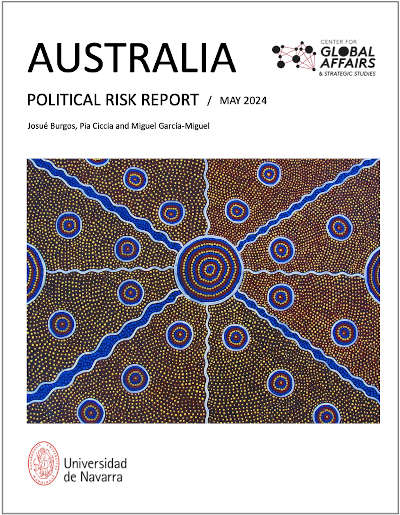In the image
Australian indigenous pattern [pxhere.com]
EXECUTIVE SUMMARY
The purpose of this Political Risk Report 2024 is to assess Australia’s internal strength: its economy; its energy and raw materials sector; its political and social cohesion; and the stability with which it will face the coming years.
Regarding its economy, domestic pressures coupled with a weak global economic outlook will result in GDP growth remaining below trend, from 2.1% in 2023 to 2% in 2025. Although, new infrastructural developments and a rebound in the services sector sectors will contribute to further growth in the medium term. Moreover, high levels of foreign direct investment in key sub-sectors make it an ideal location for investment and trade. This is exemplified by the country’s wide range of economic partnerships in the Indo-Pacific and Europe.
Concerning raw materials and energy, the effects of climate change will become increasingly present, creating domestic and international pressures for shifting towards renewable energy. Furthermore, its dependence on coal as a major source of energy and electricity undermines efforts towards clean energy transition in the short-medium term. Australia’s diversification of its critical minerals supply chain will improve its position as a primary actor in this field, without displacing China as the dominant supplier. The Labor government is committed to ensuring a transformation towards green energy, but this could easily change in the medium term if the Coalition wins the next elections.
Lastly, political uncertainty will continue in the short term with the Labor Party having better prospects of remaining in government. It is unlikely that a referendum on the monarchy issue is convened in the medium-term, as other matters will be more pressing on the political agenda. Aboriginal issues will remain being a divisive matter. Consequently, it is likely that regional Voices will be implemented in the medium term. In the social aspect, hardships will continue in the short term due to the high costs of living, related with the new migration strategy, the housing crisis and the private education system. Despite increasing tensions with China, a social disruption of the community is unlikely to happen in the short term.


